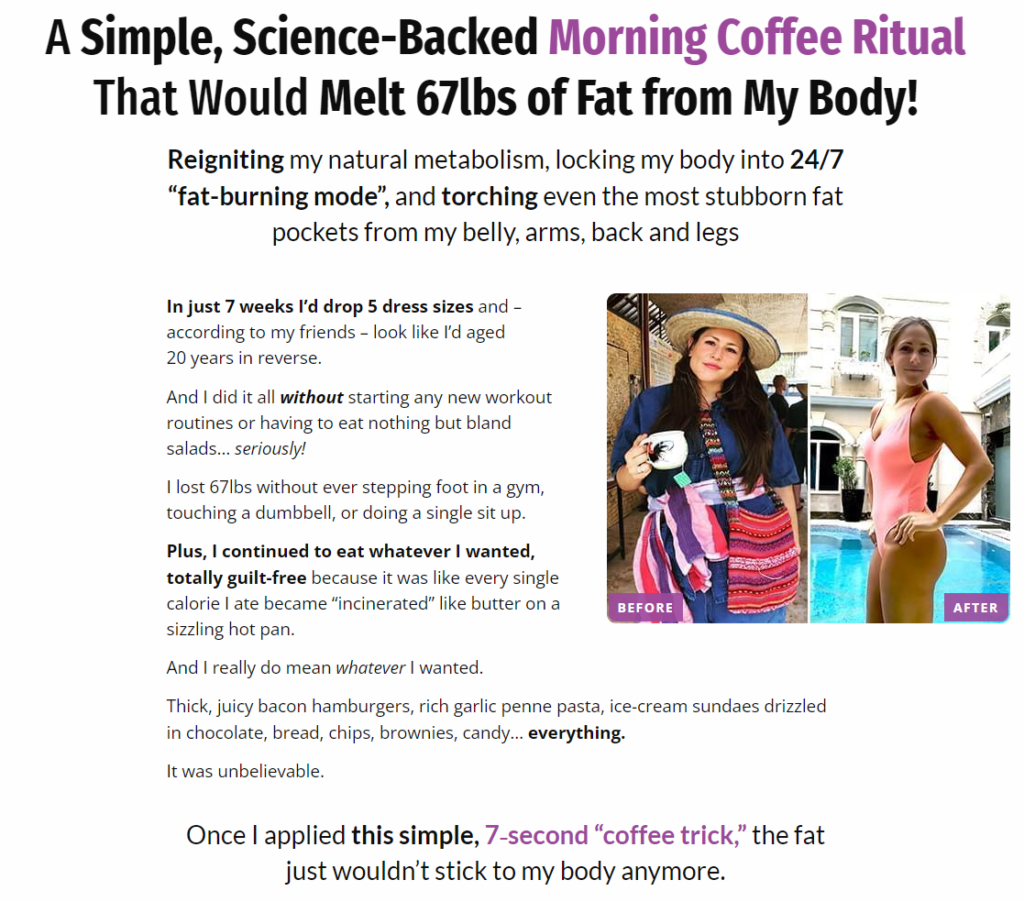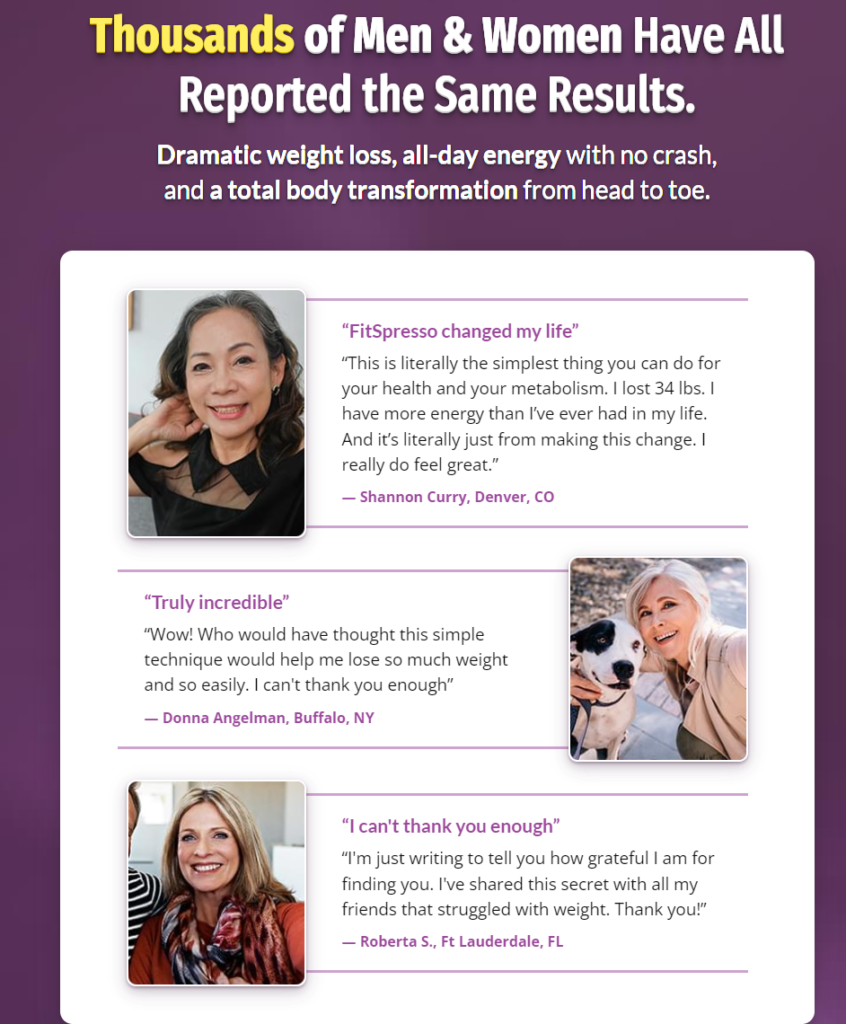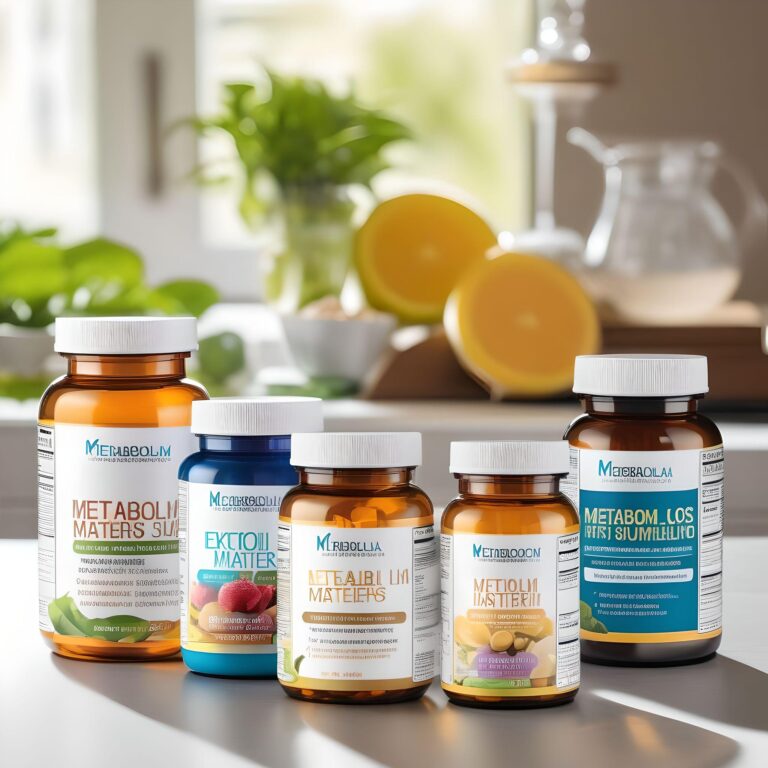FitSpresso is generating a lot of buzz in the weight loss supplement market with its unique “7-second coffee ritual.” Marketed as a natural and effective solution to weight management, FitSpresso promises to help users shed unwanted pounds, boost metabolism, and improve overall health with minimal effort.
However, with so many weight loss products making similar claims, it’s important to scrutinize whether FitSpresso lives up to the hype or is just another overblown product.
This comprehensive review will explore all aspects of FitSpresso, including its ingredients, benefits, potential side effects, scientific backing, and real user experiences.

FitSpresso Reviews: Overall Impressions
FitSpresso has garnered significant attention and generally positive reviews. Many users report positive results in their weight loss journey, citing increased energy levels, better appetite control, and overall well-being. However, as with any supplement, results can vary from person to person, and not everyone experiences the same benefits.

Here’s an in-depth look at what makes FitSpresso a standout product in the crowded weight loss supplement market.
FitSpresso Pros and Cons
Before diving into the detailed analysis, let’s take a look at the pros and cons of FitSpresso.
FitSpresso Pros
- Natural Ingredients: Composed of scientifically-backed, natural ingredients.
- Convenient: Easy to integrate into daily routine with a simple 7-second ritual.
- Boosts Metabolism: Enhances metabolic rate to aid weight loss.
- Suppresses Appetite: Helps control cravings and reduce calorie intake.
- Increases Energy Levels: Provides sustained energy throughout the day.
- Improves Mental Clarity: Supports cognitive function and reduces stress.
- Positive User Reviews: High satisfaction rate among users.
- Money-Back Guarantee: 180-day money-back guarantee for risk-free trial.
- No Major Lifestyle Changes Needed: Simple addition to your routine without drastic changes.
FitSpresso Cons
- Requires Consistency: Must be taken daily for best results.
- Not Suitable for Everyone: Not recommended for pregnant or nursing women.
- Limited Availability: Only available through the official website.
- Possible Mild Side Effects: Some users may experience digestive discomfort or caffeine sensitivity.
Slim Down Effortlessly! – Try FitSpresso and achieve your dream body!
What is FitSpresso?
FitSpresso is a dietary supplement designed to support weight loss and overall health. It is formulated with natural ingredients that work synergistically to boost metabolism, enhance fat oxidation, suppress appetite, and improve energy levels. The supplement is intended to be taken with your morning coffee, leveraging the benefits of caffeine to enhance its effectiveness.
How Does FitSpresso Work?
FitSpresso is designed to complement the body’s natural fat-burning processes, especially when combined with the stimulatory effects of caffeine from coffee. Here’s how it works:
Boosts Metabolism
Ingredients like Chlorogenic Acid and EGCG increase metabolic rate, helping you burn more calories even at rest. This increased metabolic rate is crucial for sustained weight loss, as it ensures that your body continues to burn calories efficiently throughout the day.
Enhances Fat Oxidation
L-Carnitine facilitates the transport of fatty acids into the mitochondria, where they are converted into energy, thus promoting fat loss. This process not only aids in weight reduction but also ensures that your body uses stored fat as a primary energy source.
Suppresses Appetite
L-Theanine and Chromium help reduce cravings and control appetite, making it easier to stick to a healthy diet. Appetite suppression is a critical factor in weight management, as it helps prevent overeating and reduces the temptation to indulge in unhealthy snacks.
Improves Energy Levels
The combination of caffeine and L-Carnitine provides a sustained energy boost, enhancing physical and mental performance. Increased energy levels help you stay active and motivated, which is essential for maintaining an exercise routine and achieving long-term weight loss goals.
Supports Mental Clarity
L-Theanine’s calming effects help improve focus and reduce stress, which is crucial for maintaining a consistent weight loss regimen. Mental clarity and reduced stress levels can also prevent emotional eating and other behaviors that may hinder weight loss progress.
FitSpresso Ingredients: An In-Depth Analysis Backed by Scientific Evidence

FitSpresso’s effectiveness is largely due to its carefully selected natural ingredients. Here’s an in-depth look at the key components and their roles in supporting weight loss:
Chlorogenic Acid (CGA)
Source: Extracted from green coffee beans.
Description: Chlorogenic Acid is renowned for its antioxidant properties and its ability to reduce the absorption of carbohydrates and fats, aiding in weight loss. It also helps lower blood sugar levels and improves insulin sensitivity, both crucial for weight management.
Benefits:
- Reduces absorption of carbohydrates and fats.
- Lowers blood sugar levels.
- Improves insulin sensitivity.
Scientific Evidence: A study published in the Journal of International Medical Research found that Chlorogenic Acid supplementation significantly reduced body weight and fat mass in overweight individuals. The study highlighted its role in reducing the absorption of glucose and fat.
L-Carnitine
Source: Naturally found in red meat and dairy products.
Description: L-Carnitine plays a crucial role in the transportation of fatty acids into the mitochondria, where they are burned for energy. This process not only aids in fat loss but also enhances energy levels and physical performance.
Benefits:
- Transports fatty acids for energy conversion.
- Enhances physical performance.
- Boosts energy levels.
Scientific Evidence: Research in the journal Obesity Reviews indicates that L-Carnitine supplementation can lead to a modest reduction in body weight and BMI. The study also noted improvements in energy levels and physical performance.
EGCG (Epigallocatechin Gallate)
Source: Green tea.
Description: EGCG is a powerful antioxidant that supports fat oxidation and increases metabolic rate. It also has anti-inflammatory properties and can improve cardiovascular health.
Benefits:
- Supports fat oxidation.
- Increases metabolic rate.
- Provides anti-inflammatory benefits.
Scientific Evidence: A meta-analysis published in the International Journal of Obesity found that EGCG, particularly when combined with caffeine, significantly increased energy expenditure and fat oxidation, contributing to weight loss.
Chromium
Source: Found in foods like broccoli, grape juice, and whole grains.
Description: Chromium is essential for carbohydrate and lipid metabolism. It helps improve insulin sensitivity, which can aid in reducing body fat and maintaining a healthy weight.
Benefits:
- Improves insulin sensitivity.
- Aids in carbohydrate and lipid metabolism.
- Helps maintain a healthy weight.
Scientific Evidence: Studies have shown that Chromium supplementation improves insulin sensitivity and lipid metabolism, which can aid in reducing body fat and maintaining a healthy weight.
L-Theanine
Source: Predominantly found in green tea.
Description: L-Theanine promotes relaxation without causing drowsiness, counteracting the jittery effects of caffeine. It also supports cognitive function and enhances mood, which can be beneficial for maintaining motivation during a weight loss journey.
Benefits:
- Promotes relaxation without drowsiness.
- Enhances cognitive function.
- Improves mood and focus.
Scientific Evidence: Research in the Journal of Clinical Psychiatry suggests that L-Theanine enhances alpha brain wave activity, promoting relaxation and mental clarity without causing drowsiness. This can help users maintain focus and reduce stress during their weight loss journey.
Health Benefits of Using FitSpresso

FitSpresso offers a range of health benefits beyond weight loss. Here are some of the key advantages:
Weight Loss
The primary benefit of FitSpresso is weight loss, achieved through enhanced metabolism and fat oxidation. Users report gradual weight loss over several weeks, with some experiencing significant changes in body composition.
Increased Energy
Many users note a substantial increase in energy levels, which helps them stay active and engaged throughout the day. This boost in energy is crucial for maintaining an exercise routine and preventing fatigue.
Appetite Control
FitSpresso helps control appetite and reduce cravings, making it easier to adhere to a calorie-restricted diet. This appetite suppression is a critical factor in long-term weight loss success.
Mental Clarity and Focus
The combination of caffeine and L-Theanine improves mental clarity and focus, helping users stay productive and motivated. This cognitive enhancement is an added benefit that sets FitSpresso apart from other weight loss supplements.
Improved Metabolic Health
Ingredients like Chromium and Chlorogenic Acid improve insulin sensitivity and support healthy blood sugar levels, which are essential for metabolic health and weight management.
Burn Fat Naturally! – Order FitSpresso and feel the difference!
Potential Side Effects of FitSpresso
FitSpresso is generally well-tolerated, but some users may experience mild side effects:
Digestive Discomfort
Chlorogenic Acid can cause digestive issues in some individuals, such as stomach upset or diarrhea. It’s advisable to start with a lower dose to assess tolerance and gradually increase it.
Caffeine Sensitivity
Users sensitive to caffeine may experience jitters, insomnia, or increased heart rate. It’s important to monitor caffeine intake from other sources while using FitSpresso to avoid excessive consumption.
Allergic Reactions
While FitSpresso is free from common allergens, individuals with specific sensitivities should review the ingredient list carefully. If you have any known allergies to the components, consult with a healthcare provider before starting the supplement.
How to Use FitSpresso?
FitSpresso is designed to be easy to use, integrating seamlessly into your daily coffee routine. Here’s how to use it:
Dosage
Take two capsules daily with your morning coffee. This allows the ingredients to work synergistically with the caffeine in your coffee, enhancing their effectiveness.
Timing
For best results, take FitSpresso on an empty stomach. This ensures optimal absorption of the ingredients and maximizes their impact on your metabolism.
Consistency
Regular use is essential for optimal results. It’s recommended to use FitSpresso for at least 3 to 6 months to see significant changes. Consistency in taking the supplement daily helps maintain the metabolic and appetite control benefits over time.
FitSpresso Customer Reviews

Emily from New York
“I was skeptical about FitSpresso at first, but after trying it for a few weeks, I’m pleasantly surprised. The energy boost I get is amazing, and I’ve noticed a difference in my metabolism. FitSpresso really works!”
James from California
“As someone who’s tried numerous weight loss supplements, FitSpresso stands out. The combination of ingredients, especially the coffee loophole, makes it unique. I’ve seen real results without feeling jittery or experiencing side effects.”
Sarah from Texas
“I decided to give FitSpresso a try after reading some independent reviews online. I’m glad I did! It’s helped me curb my cravings and stay focused throughout the day. Plus, it’s easy to incorporate into my morning routine.”
Michael from Florida
“FitSpresso has been a game-changer for me. I’ve struggled with weight loss for years, but this supplement has made it easier. The real reviews I read were spot on – it’s effective and safe to use.”
Jessica from Illinois
“I came across FitSpresso while searching for natural weight loss solutions. The positive feedback from real users convinced me to give it a shot. I’m thrilled with the results so far – I’ve lost weight and feel more energized.”
David from Nevada
“FitSpresso has become an essential part of my daily routine. The honest independent reviews I read convinced me to try it, and I’m grateful I did. It’s not just about weight loss; it’s about feeling healthier and more energized overall.”
These customer reviews highlight the effectiveness and positive experiences of individuals who have tried FitSpresso. They mention key aspects such as increased energy levels, curbed cravings, and ease of use, while also emphasizing the authenticity of the product and its real-world impact.
Where to Buy FitSpresso?
FitSpresso is exclusively available for purchase on its official website. This decision was made to ensure that customers receive only authentic products directly from the manufacturer, minimizing the risk of counterfeit supplements circulating in the market.

By purchasing from the official website, customers can have peace of mind knowing they are investing in a genuine and high-quality product.
How To Order FitSpresso? Price Details And Refund Policy
Usually, most people head to e-commerce stores to buy everything including supplements. But, have you ever noticed that the manufacturer’s details given for the same formula sometimes differ? This is mainly because one of them is the counterfeit of the original supplement.
To avoid this, the creator has limited the sales to its official website. This way, it ensures that when you purchase, you will only get the original one. Moreover, the manufacturer provides FitSpresso weight loss formula at an exclusive discount on the website.
The FitSpresso price details mentioned on the website are as follows:
- 1 Bottle (30-day supply) – $59+ free shipping
- 3 Bottles (90-day supply) – $49 Per bottles free shipping
- 6 Bottles (180-day supply) – $39 Per bottles free shipping
In addition to these discounts, the creator also offers a trustworthy 100% 180-day money-back guarantee. So, if you happen to be dissatisfied with the results, you can simply claim a refund. However, make sure to claim it within the first 180 days of purchase.
Additionally, every multi-purchase order of this supplement comes with 2 useful bonuses. Further details about the bonuses are mentioned on the website. So, you can check the FitSpresso website if you want to learn more about them.
FitSpresso vs Mitolyn: Which One Should You Choose?
Both FitSpresso and Mitolyn are popular wellness supplements aimed at boosting energy and supporting weight management—but they differ significantly in approach, ingredients, and long-term benefits.
Core Focus
| Feature | Mitolyn | FitSpresso |
| Target Function | Mitochondrial health & energy metabolism | Thermogenic fat-burning & energy boost |
| Approach | Cellular energy + fat oxidation | Appetite control + metabolism kick |
| Best For | Fatigue, slow metabolism, midlife weight | Weight loss, hunger control, quick boost |
Key Ingredients
| Ingredient Type | Mitolyn | FitSpresso |
| Mitochondrial Support | Maqui Berry, Rhodiola, Astaxanthin, Amla | ❌ None |
| Fat-Burning/Metabolism | Schisandra, Theobroma Cacao | Green Tea Extract, Chromium, Green Coffee, L-Carnitine |
| Antioxidants | High (Maqui, Amla, Astaxanthin) | Moderate (Green Tea, Green Coffee) |
| Appetite Control | ❌ Not targeted | ✅ Yes (via stimulant and chromium support) |
| Stimulants | ❌ None | ⚠️ Yes (caffeine from green coffee/tea) |
Safety & Use
| Criteria | Mitolyn | FitSpresso |
| Stimulant-Free | ✅ Yes | ❌ No (contains natural caffeine) |
| Non-GMO & Natural | ✅ Yes | ⚠️ May vary by batch |
| Best Time to Take | Morning with food | Morning or before workout |
| Long-Term Use | ✅ Designed for consistent daily use | ⚠️ May require cycling due to stimulants |
Price & Value
| Feature | Mitolyn | FitSpresso |
| Starting Price | $59 (1 Bottle) | ~$49 (Varies by seller) |
| Best Offer | $39 per bottle (6-month supply) | Varies; often $33–$45 per bottle |
| Money-Back Guarantee | ✅ 90 days | ✅ 60 days |
| Sold Where? | Official Website Only | Official Website & Some Marketplaces |
✅ Verdict: Which Should You Choose?
| Choose Mitolyn if you want: |
| ✔️ Deep energy support without caffeine |
| ✔️ Mitochondrial and metabolic health focus |
| ✔️ Science-backed cellular repair for long-term vitality |
| Choose FitSpresso if you want: |
| ⚡ Fast-acting fat-burning and appetite suppression |
| ☕ Don’t mind caffeine-based energy |
| 🎯 A short-term boost for workouts or dieting phases |
Mitolyn is better for those seeking sustainable energy, metabolism support, and cellular rejuvenation.
FitSpresso works well for fast-acting weight loss or appetite control—especially if you tolerate caffeine.
FitSpresso Reviews – Final Word
From the detailed analysis of the FitSpresso review, it can be observed that this weight loss aid has made significant changes for many people. This supplement stands out in the market because of its quality and effectiveness. The manufacturer has used only natural and plant-based ingredients in the formula.
The supplement helps to aid in weight loss and improve overall health. The natural ingredients in the dietary formula manage the body’s natural circadian rhythm and help the fat cells release stored fat. FitSpresso weight reduction aid also supports healthy metabolism, improves brain function, boosts stamina, and supports overall health.
The majority of the users have positives to say about the supplement. They say that it not only helps in maintaining a healthy body but also supports brain functions. There are no complaints related to the side effects of the weight loss pill. The manufacturing process is done in a safe and sterile condition.
Also, FitSpresso formula is free from GMOs, stimulants, or artificial chemicals. Taking all these into consideration, it seems to be a genuine formula to try.
FAQs about FitSpresso
Is FitSpresso Available in the UK, CA, and AU?
Yes, FitSpresso is available for purchase in the UK, Canada, and Australia. However, it is important to note that the product is exclusively sold through the official website to ensure authenticity and quality control.
Is FitSpresso safe to use?
Yes, FitSpresso is formulated with natural ingredients and undergoes rigorous testing to ensure safety and efficacy. It is manufactured in facilities that adhere to Good Manufacturing Practices (GMP), further ensuring product quality and safety.
How Long Does it Take to See Results on FitSpresso?
Results may vary depending on individual factors such as metabolism, diet, and exercise habits. However, many users report noticing positive changes within a few weeks of consistent use. For optimal results, it is recommended to use FitSpresso as part of a healthy lifestyle.
Is FitSpresso safe and legit?
Yes, FitSpresso is a legitimate product manufactured by a reputable company. It has received positive reviews from satisfied customers and is backed by a 100% satisfaction guarantee.
Is FitSpresso FDA approved?
While FitSpresso itself may not be FDA approved, it is formulated with ingredients that are generally recognized as safe (GRAS) by the FDA. Additionally, it is manufactured in FDA registered facilities that adhere to strict quality standards.
Is FitSpresso gluten free?
Yes, FitSpresso is gluten-free, making it suitable for individuals with gluten sensitivities or allergies. The product is formulated with carefully selected ingredients to cater to a wide range of dietary preferences and restrictions.
What are the side effects of FitSpresso?
FitSpresso coffee is generally well-tolerated, but some users may experience mild side effects such as digestive discomfort or caffeine sensitivity. It’s advisable to start with a lower dose to assess tolerance and gradually increase it. If you experience any adverse effects, discontinue use and consult with a healthcare provider.
What are the ingredients in FitSpresso?
FitSpresso contains a blend of natural ingredients, including Chlorogenic Acid, L-Carnitine, EGCG, Chromium, and L-Theanine. These ingredients work synergistically to support weight loss, enhance metabolism, and improve overall health.
Do you have to drink coffee with FitSpresso?
While FitSpresso is designed to be taken with coffee to enhance its effectiveness, it can be taken with any other beverage of your choice. However, combining it with coffee helps maximize the benefits of the caffeine present in both the supplement and the coffee.
What is the best weight loss pill?
The best weight loss pill varies from person to person based on individual needs and health conditions. FitSpresso is a promising option due to its natural ingredients and positive user reviews. It’s important to consult with a healthcare provider before starting any weight loss supplement.
Is berberine good for weight loss?
Yes, berberine has been shown to support weight loss by improving insulin sensitivity, reducing glucose production in the liver, and promoting fat loss. It is often used in weight management supplements for its metabolic benefits.
How much does FitSpresso cost?
FitSpresso is available in different packages: $59 for one bottle (30-day supply), $147 for three bottles (90-day supply), and $234 for six bottles (180-day supply). All packages come with free shipping and a 180-day money-back guarantee.
Which type of coffee is best for weight loss?
Black coffee is considered the best for weight loss due to its low calorie content and ability to boost metabolism. Adding FitSpresso to your black coffee can enhance its weight loss benefits.
What can you add to coffee for weight loss?
Adding FitSpresso to your coffee can enhance its weight loss benefits. Other healthy additions include cinnamon, which can stabilize blood sugar levels, and a splash of unsweetened almond milk for added creaminess without extra calories.
What are FitSpresso ingredients?
FitSpresso contains Chlorogenic Acid, L-Carnitine, EGCG, Chromium, and L-Theanine. These natural ingredients are scientifically proven to support weight loss, enhance metabolism, and improve overall health.
Does black coffee help you lose weight?
Yes, black coffee can help with weight loss by boosting metabolism, increasing fat oxidation, and providing a low-calorie beverage option. It also contains antioxidants that support overall health.
How much does FitSpresso cost?
FitSpresso costs $59 for one bottle (30-day supply), $147 for three bottles (90-day supply), and $234 for six bottles (180-day supply). All packages come with free shipping and a 180-day money-back guarantee.
What are the ingredients in FitSpresso?
FitSpresso contains a blend of natural ingredients, including Chlorogenic Acid, L-Carnitine, EGCG, Chromium, and L-Theanine. These ingredients work synergistically to support weight loss, enhance metabolism, and improve overall health.
FitSpresso Verdict
Overall, the reviews of FitSpresso are mostly positive (Rating 4.92/5). It seems to be a safe and effective way to help you lose weight without having to make any major lifestyle changes. If you’re looking for an easy and convenient way to lose weight, then this product may be worth considering.
Fast-Track Your Weight Loss! – Get FitSpresso and begin your journey now!




















